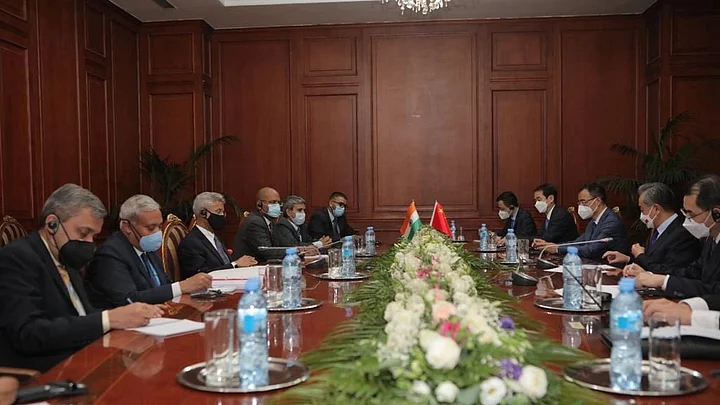For the first time since the Taliban took over Kabul, Prime Minister Narendra Modi in his virtual address at the Shanghai Cooperation Organisation (SCO) meet on Friday, 17 September, said that the change of power in Afghanistan was not inclusive and it happened without negotiation.
"This also raises questions over acceptance of the new system as the representatives of women, minorities and other sections of the Afghan society did not get representation in the government."PM Narendra Modi
PM Modi emphasied that the representation of women, minorities and all sections of Afghan society is essential.
He stressed that the recent developments in Afghanistan can lead to an increase in the trafficking of illegal arms, drugs and human trafficking.
Meanwhile, the Dushanbe Declaration was adopted at SCO meet. "Member States believe that it is critical to have an inclusive government in Afghanistan, with representatives from all ethnic, religious, and political groups of Afghan society", news agency ANI reported.
Stating India’s support for the United Nations, Modi said, “It is essential that the global community take a decision on the recognition of the new system, collectively and with proper deliberation.”
Humanitarian Crisis in Afghanistan: PM
Modi added, "If instability and fundamentalism continue in Afghanistan, terrorist and extremist ideologies will be encouraged across the world. Other extremist organisations might get the encouragement to grab the power through violence."
Referring to the Taliban takeover of the war-torn country, Modi added, "There's a serious humanitarian crisis in Afghanistan. Due to obstacles in financial and trade flows, financial constraints of the people of Afghanistan is rising. The COVID challenge, along with it, is a cause of distress for them", ANI reported.
The prime minister also said, "Together, we should ensure that humanitarian aid reaches Afghanistan smoothly. There has been a special relationship between Indians and Afghans. All regional and global initiatives for Afghan society's help will have India's full support."
Need To Establish a Relationship Based on 'Mutual Respect': EAM
Meanwhile, on the sidelines of the SCO meet on Friday, External Affairs Minister S Jaishankar met with his Chinese counterpart Wang Yi to discuss a resolution on the remaining border issues between the two countries.
According to PTI, the two foreign ministers who met in Dushanbe agree that both sides need to meet again and discuss disengagement at the eastern Ladakh border.
Quoting an MEA statement, the report stated that Jaishankar told Wang that Asian solidarity depends on the example set by India-China relations and both sides need to establish a relationship based on “mutual respect”.
Speaking to Twitter, Jaishankar said that “India does not subscribe to an any clash of civilisations theory“ and that “it is also essential that China does not view its relations with India through the lens of a third country".
According to an MEA statement, both ministers also exchanged views on Afghanistan and its ongoing developments.
Responding to a question on the India-China standoff on 16 September, MEA spokesperson Arindam Bagch says that India’s position remains the same.
"We reiterate our position that completion of disengagement in the remaining areas can pave the way forward for two sides to consider de-escalation of forces and ensure full restoration of peace and tranquility and enable bilateral relations," said Bagchi.
In a veiled reference to China on connectivity issues, PM Modi in his virtual SCO speech said that any connectivity initiative cannot be a one-way street initiative.
"It must be ensured, consultative, transparent and participatory. There should be respect for territorial integrity of all countries," Modi said and also batted for Chabahar and North South International Corridor.
In reference to Afghanistan, PM Modi stated that radicalisation and trust deficit were the biggest challenges to peace in Central Asia and the recent developments in Afghanistan had made this challenge more clear.
(With inputs from PTI, IANS)
(At The Quint, we question everything. Play an active role in shaping our journalism by becoming a member today.)
